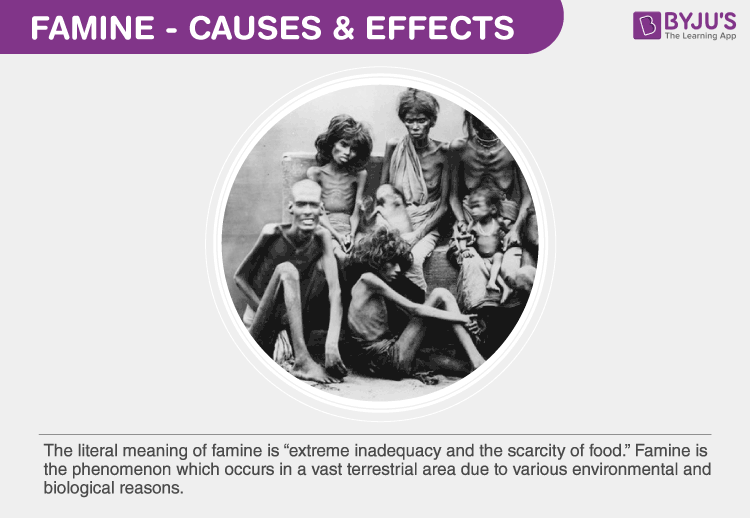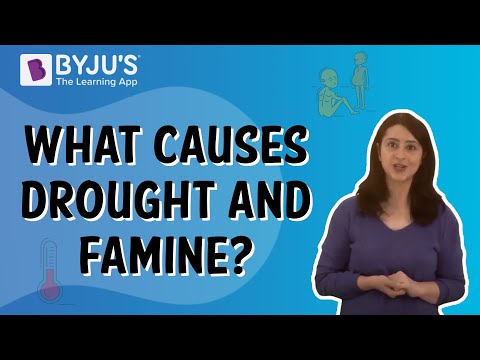The literal meaning of famine is “extreme inadequacy and the scarcity of food.” Famine is the phenomenon which occurs in a vast terrestrial area due to various environmental and biological reasons. Some of the prime reasons are population imbalance, scarcity of water or lack of rainfall, population imbalance, crop failure, government policies.

Famines in India
Famine in Indian sub-continent is a chronicle feature. Agriculture in India is heavily dependent on a suitable climate. Rains in summer are important for the irrigation of crops. Lack of rainfall and droughts had lead to several famines in India between the 11th and 17th centuries severely.
Notable Famines in India
- Bengal Famine of 1943
- Chalisa Famine of 1783
- Great Bengal Famine of 1770
- Skull Famine of 1791
- Orissa Famine of 1866
- Deccan Famine of 1630
- Bihar Famine of 1873
- Agra Famine of 1837
These famines caused a widespread scarcity of food and were responsible for numerous deaths across the country. The most significant famines in this list are the great Bengal famine of 1770 caused around 10 million deaths, skull famine or Doji bara famine caused 11 million deaths and Chalisa famine which also caused 11 million deaths approximately.
Also Read: Solid Waste Management
Causes of Famines
Natural Causes
- Floods, cyclone, storms
- Droughts
- Earthquake
Droughts cause extreme scarcity of water and thus results in crop failure. On the other hand, floods and earthquakes can destroy crops or food storage places. These all result in food scarcity and eventually famines.
To Know, What Causes Drought And Famine?, Watch The Below Video:

Man-made Reasons
- Lack of food (due to no crop failure or no storage of food)
- No proper food distribution in certain regions
- Consumption of contaminated water and air. Crop irrigation impossible in such situations.
There were various famines that were man-made. Grabbing land, wars and improper administration were the main reasons for many of the famines in recent history.
Effects of Famines
Starvation is nothing but the biological consequences of a continuous scarcity of food. During the famine, starvation occurs on a mass scale.
Various diseases occur in the human body during famine-like cholera. It is caused by bacteria, Vibrio cholerae, which leads to an increased amount of water to be released from cells that line the intestines. Symptoms include watery diarrhoea, abdominal cramps, dry, mucous membranes, mouth, and skin, excessive thirst and lethargy.
Dropsy, which is now referred to as oedema is caused due to excessive fluid under the skin, the body swells. The affected area often retains a dimple after being pressed for a few seconds.
Dysentery is another bacterial disease which spreads through water, stool, and food. Poor sanitation, contaminated food and water and crowded living conditions lead to dysentery. Symptoms include blood in the stool, abdominal pain, diarrhoea, and fever.
Another notable condition is anaemia. There can be a lot more diseases that are caused due to famines. Apart from diseases, famines also cause lower fertility rates, poor living conditions, fewer income options, various socio-political issues, etc.
Prevention of Famine
Since famine is majorly caused due to natural reasons, it is difficult to prevent it. However, there are certain ways of controlling the effects of famine.
- There should be surplus agricultural production beyond the requirements of the rural population.
- The transportation system should be well-developed between rural and urban areas.
- There should be proper health care, clean drinking water and sanitation facilities to prevent any diseases.
Also Read: Environmental Issues
To know more about famines, its causes, effects and prevention, keep visiting BYJU’S website or download BYJU’S app for further reference.

Can you guys please write how can we prevent famine ?
Famine is not something that we can really prevent. Adverse climatic conditions, coupled with social, economic and political factors will hamper the growth and development of crops regardless. However, there are some measures that can be implemented to alleviate the effects of famine.